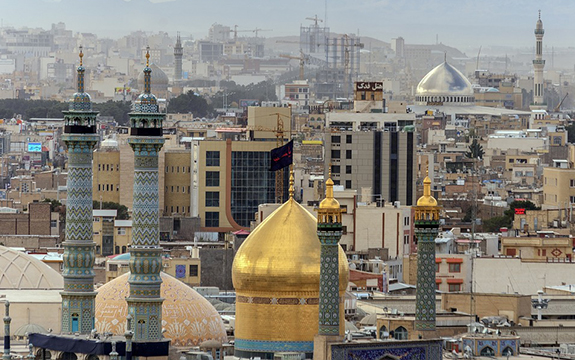Opinion: Tehran grabs Australians to taunt us into a deal

In Summary
- This is an opinion piece by Dr Jason Thomas, Lecturer in postgraduate Risk Management, Swinburne University of Technology that was originally published in The Australian
Abducting hostages for ransom is a tactic Iran has used since the 1979 Islamic Revolution. It is why three Australians, cruelly trapped as part of a strategic political masterplan, are being held by Iran now.
This is in addition to the recent cruise missile and drone attacks on Saudi Arabia’s Aramco oil refinery network and attacks on oil tankers in the Strait of Hormuz. These are part of the asymmetric warfare Iran employs for strategic effect. The hope is to sow division and disunity within allies and friends. In the case of Australia, the aim is to disrupt our relationship with the US and extract costly concessions. And we should prepare for more of it.
University of Melbourne academic Kylie Moore-Gilbert was taken prisoner 10 months ago, soon after the US reimposed oil sanctions on Iran. The most recent hostages are two British-Australian bloggers. They were travelling in the wrong country at the wrong time, doing the wrong thing — flying a drone. Now they are locked into the same tactics. In August Scott Morrison announced Australia would make a “modest, meaningful and time-limited contribution” to security in the Strait of Hormuz. Immediately Iran warned Australia to keep out of the Gulf. Soon after it announced it was holding the three Australians.
While normally the practice of terrorists such as Islamic State, al- Qa’ida and Somali pirates, Iran also likes to take hostages. During the Islamic Revolution students held more than 50 Americans in the US embassy for 444 days. As the Iranian nuclear agreement was being thrashed out during the Obama administration, it became hard for negotiators not to include the US prisoners being held at that time. Following the nuclear agreement and on the eve of sanctions being lifted, Iran released four Americans. Yet it continues to hold at least five US nationals.
Consider the plight of British-Iranian dual national Nazanin Zaghari-Ratcliffe. She has been held since 2016. Allegedly she was single-handedly planning to overthrow the Iranian government. Now Iran is considering doing a deal for an alleged £400m ($732.9m) it claims is owed by the British government. In relation to the Australian prisoners, Iran saw an opportunity to secure a bargaining chip in the future and drive a wedge between the US and one of its most staunch allies.
It may seem odd to suggest hostage-taking is a tactic of asymmetric warfare. The common assumption is warfare of any kind is physical. In fact, asymmetric warfare has been the dominant form of conflict throughout human history. It is how much of the Cold War was fought. It has been cultural, moral, mental and economic — and now it includes cyber. We receive 15 per cent of our crude oil and 30 per cent of our refined oil through the Strait of Hormuz. So the Prime Minister is right to act - instability in this strategic location is an economic threat to us.
The challenge for the West is how to protect our foreign and domestic interests from these indirect tactics. As British geopolitical theorist Halford Mackinder observed: “Democracy refuses to think strategically unless and until compelled to do so for purposes of defence.” We need to wake up to the games being played, not only just by Iran but also China. Instead, the West, by way of France, offers Iran a $US15bn ($22.3bn) bribe as compensation for revenue lost through US oil sanctions, which defeats the point.
One of the key components of asymmetric warfare is how your opponent reacts. The trick is forcing them into overreacting or underreacting. Last year Hamas protesters in Gaza began sending kites with flaming payloads into Israel, burning hundreds of hectares of farmland. Hamas then threatened that if a single kite-flyer was shot by Israeli soldiers, it would retaliate with rockets.
With today’s clash against Iran, US President Donald Trump will be branded a warmonger if he launches military action, and he will stand accused of breaking his election promise of not dragging the US into more wars. If Trump underreacts, his domestic support is undermined. It also demonstrates to others that the tough talk is just that. This then frustrates friends and allies who assumed they could rely on US.
The West will continue to cycle in and out of messy, low-intensity, small wars engineered by our enemies. For them it is a more cost-effective alternative to conventional warfare. Iran’s Islamic Revolutionary Guards Corps Quds Force supports armed groups in Iraq, Syria, Lebanon, Afghanistan and Yemen. Last week the US embassy in Baghdad came under rocket attack, almost certainly by Iranian proxies there.
We live in volatile, uncertain, complex and ambiguous times. The speed of change and our inability to always anticipate our enemies’ actions are challenging dimensions as we seek to control the risks they pose. The Trump administration has shifted from finding and finishing terrorists, and is reorienting towards potential conventional conflict with China, Iran and Russia. Yet the interests of these states will be pursued indirectly. They are not going to engage conventionally with the US. As the major players did during the Cold War, power will be exercised through non-state actors using asymmetric tactics.
When the terrain holds such economic importance to Australia as the Strait of Hormuz, then we have an obligation to participate. But with three Australians held in Iran, it places the government in a bind at a critical time. Without giving ground on key demands by Iran, the trio’s future looks bleak.
Jason Thomas teaches risk management at Swinburne University of Technology and is director of Frontier Assessments. Read his opinion piece originally published in The Australian.

